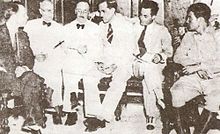Sergio Carbó
Dr. Sergio Carbó | |
|---|---|
| Cuban Secretary of War | |
| In office September 5, 1933 – September 10, 1933 | |
| Constituency | Republic of Cuba |
| Personal details | |
| Born | Sergio Carbó y Morera 1891 La Habana, Cuba |
| Died | April 18, 1971 Miami, United States |
| Nationality | |
| Political party | Cuban Revolutionary Party |
| Children | Ulises Carbo |
Sergio Carbó (born 1891 - April 18, 1971) was a prominent Conservative journalist[1] and leader of the Cuban Revolutionary party.
Early history[edit]
Sergio Carbó was born in the La Habana Province of Cuba.[2]
Journalism[edit]
Sergio Carbó was the founder and the editor-in-chief of La Semana, a weekly political commentary journal, in 1925.[3] He started Zig-Zag in 1938[4] which was later re-established in Miami in 1960.[5] From 1941 to 1960, he was the owner and director of the daily Havana newspaper Prensa Libre.[6]
Carbó had been detained in the political prison at La Cabaña Fortress in January 1931, for publishing content in his newspaper, La Semana, that the government found objectionable prior to his eventual release in February 1931.[7]
Rise to power[edit]
Revolutionary expedition[edit]
In May 1931, Carbó and Carlos Hevia equipped and led an expeditionary force from the United States which landed in Gíbara, a small community in the province of Oriente (now Holguín Province).[8] It was an attempt to oust Gerardo Machado's dictatorship, but it was suppressed by Machado's army.[9] Carbó was later charged with inspiring a rebellion in Oriente Province.[10]
Cuban Revolution of 1933[edit]

In August 1933, an army revolt in Havana forced President Machado to flee Cuba and he was succeeded by Carlos Manuel de Céspedes y Quesada.[11] The Céspedes administration assumed power on August 12, 1933, until Sergeant Fulgencio Batista staged a coup d'état called the Sergeants' Revolt on September 4, 1933.[12] Carbó was a leading factor in the uprising which brought the downfall of the Cespedes' presidency.[13]
Pentarchy of 1933[edit]

An executive committee of five men including Carbó, Dr. Ramón Grau, José Irisarri, Dr. Guillermo Portela, and Porfirio Franca replaced the Céspedes cabinet as Cuba's governmental leaders.[14] On the committee, Carbó, a member of the Student Directory, acted as the Secretary of War.[15] Following the coup, the five-member junta—also referred to as The Pentarquia—served as a transitional administration for just five days.
One Hundred Days Government[edit]
Within a week, Dr. Ramón Grau was promoted to president, replacing the Pentarchy with the One Hundred Days Government on September 10, 1933.[16] On November 13, 1933, Carbó accused the United States ambassador to Cuba, Sumner Welles, of supporting an attempted uprising against President Grau's regime and asked that he be removed from his post.[17] On January 15, 1934, Sergeant Batista forced Grau to resign, ending Grau's government of slightly more than a hundred days.
On October 16, 1934, Carbó was declared not guilty in an urgency court of publishing articles against the government.[18]
Carbó was an officer of the exile group, the Cuban Revolutionary Council[19] and on April 21, 1961, he was acting as coordinator-general of the anti-Castro Cuban Democratic Revolutionary Front (FRD).[20]
Death[edit]
Sergio Carbó died in Miami, Florida at Mercy Hospital on April 18, 1971.[21]
References[edit]
- ^ Indianapolis Times 22 May 1933 — Hoosier State Chronicles: Indiana’s Digital Historic Newspaper Program.” Newspapers.library.in.gov, Indianapolis Times, 22 May 1933, newspapers.library.in.gov/?a=d&d=IPT19330522.1.3&e=-------en-20--1--txt-txIN-------. Accessed 15 May 2024.
- ^ "Sergio Carbó: Un viaje a la Rusia roja [Mario Ramírez ed.]". in-cubadora.com. Retrieved 2024-05-14.
- ^ "Letters, Jun. 12, 1933 | Dr. Dick Grant". time.com. Retrieved 2024-05-14.
- ^ Martinez, M. A. (1973). The Multiple Meaning of Liborio in the Novels of Carlos Loveira on JSTOR. Caribbean Studies, 92. https://doi.org/25612495
- ^ "Zig-Zag Libre (Miami, Fla.) 1960-1983 [Microfilm Reel]". Library of Congress. Retrieved 2024-05-15.
- ^ "Machado: Crímenes y horrores de un regimen by Sergio Carbó (1933) | Cuban Studies". cubanstudies.history.ufl.edu. Retrieved 2024-05-14.
- ^ "Warrants Issued Against Editors - Newspapers.com™". newspapers.com. Retrieved 2024-05-15.
- ^ "Cuban Federals Dislodge Strong Force of Rebels - Newspapers.com™". newspapers.com. Retrieved 2024-05-16.
- ^ Hudson, R. A. & Library Of Congress. Federal Research Division. (2002) Cuba: A Country Study. Washington, D.C.: Federal Research Division, Library of Congress: For sale by the Supt. of Docs., U.S. G.P.O. [Pdf] Retrieved from the Library of Congress, https://www.loc.gov/item/2002018893/
- ^ "Returning Cuban Exiles May Control New Regime - Newspapers.com™". newspapers.com. Retrieved 2024-05-10.
- ^ Suchlicki, Jaime. “Stirrings of Cuban Nationalism: The Student Generation of 1930.” Journal of Inter-American Studies, vol. 10, no. 3, 1968, pp. 350–68. JSTOR, https://doi.org/10.2307/165349. Accessed 15 May 2024.
- ^ Herring, Hubert. “Can Cuba Save Herself?” Current History (1916-1940), vol. 39, no. 2, 1933, pp. 151–58. JSTOR, http://www.jstor.org/stable/45334500. Accessed 15 May 2024.
- ^ "A Power In Cuba: Sergio Carbó - Newspapers.com™". newspapers.com. Retrieved 2024-05-15.
- ^ ""The Junta Meets to Discuss the Future of the Revolution"". ddr.densho.org. Retrieved 2024-05-14.
- ^ "Junta Asks Support of All Leaders - Newspapers.com™". newspapers.com. Retrieved 2024-05-15.
- ^ Perez, Louis A. “Army Politics, Diplomacy and the Collapse of the Cuban Officer Corps: The ‘Sergeants’ Revolt’ of 1933.” Journal of Latin American Studies, vol. 6, no. 1, 1974, pp. 59–76. JSTOR, http://www.jstor.org/stable/156648. Accessed 15 May 2024.
- ^ "Welles Aided Rebels, Must Go, Says Cuba - Newspapers.com™". newspapers.com. Retrieved 2024-05-15.
- ^ "Editors Freed - Newspapers.com™". newspapers.com. Retrieved 2024-05-15.
- ^ Dubois, Jules (December 30, 1962). "Report From Latin America". The Chicago Tribune. Miami, Florida, United States.
- ^ "Newsmen Freed to Go With Fidel - Newspapers.com™". newspapers.com. Retrieved 2024-05-15.
- ^ "Sergio Carbó Obituary | The Daily Courier - Newspapers.com™". newspapers.com. Retrieved 2024-05-15.
